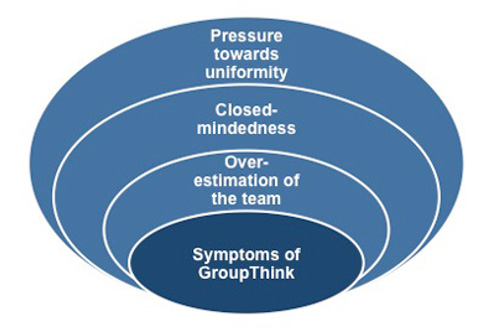Strikwerda is disappointed in other voice talent for often not charging enough. They are driving rates down for the rest of us, and we need them to cooperate. In the Facebook post accompanying his article, he expresses his position that we all have a “shared responsibility.”
"It means standing up for common interests, and having each other’s backs. It refers to a friendly spirit of cooperation. As far as I’m concerned, we have a common goal: To deliver the best service, to increase our standards, and to ensure that we’re getting paid a fair and decent rate.”
His position is fairly common, if not universal. It’s a conflict that reveals itself almost everywhere, coming down to a choice between Collectivism and Individualism. The collectivists are full of expressions about friendliness, kindness and respect—as long as you subscribe to their ideology. But what about freedom of choice? Replies Paul, “...this whole free country argument is a load of bull, used by imbeciles to defend all kinds of idiotic practices.” Well that doesn’t sound like a "friendly spirit," does it?
Clueless Olga
Paul describes “an imaginary photographer in Latvia” who wants to hire someone for a five minute VO for $20. When the quote comes in at $250 the Latvian can’t understand why, since ‘Olga will do it for 20.’ He makes a number of assumptions about Olga, which (were this story real) might well be true: “she has no idea what she’s doing” and is “probably using a Snowball microphone.” I’ve read a number of similar complaints, and have noticed a common thread:
Many voice actors are disparaging those who lowball as talentless hacks--while at once furious about the low rates they charge. If the quality of their work is so laughably pathetic, what are they worried about? Could this betray a fear that such lowballers aren’t quite as talentless as they hope? Or is it just a fundamental lack of understanding about how markets work? In the aforementioned Facebook thread, Strikwerda actually admitted…
"So many clients understand that there’s a link between low rates and low quality. So, lowballing might be a way to actually lose a job.”
So let’s get this straight: 1) A bunch of inexperienced voice actors aren’t charging high enough rates. 2) They’re clueless hacks who don’t know what they’re doing and use shitty technology. 3) “So many clients understand that there’s a link between low rates and low quality.” 4) But these lowballing hacks are still “driving down rates” for the rest of us?
My take? If a bunch of newer voice actors are doing a shitty job, this makes it easy for our work to stand out by comparison. Just as Strikwerda encourages our having confidence in charging higher rates, I’ll encourage him to be confident that if he’s an experienced, quality voice actor, he has little to fear from people like Olga. So maybe it’s time to stop sidestepping where the real fear is: that some—or even many—of the recent inflow of voice talent…might actually be good.
No Right to Permanence
The great majority of humans throughout history faced the reality that things change. When populations of deer drifted away from their hunting grounds, they either moved with them—or started hunting rabbit or squirrel. If horseless carriage manufacturing jobs dwindled, they either had to become the best worker around—or find a new line of work. If a shoemaker had little competition for 20 years, but one day there arrived dozens of immigrant cobblers, he would similarly have to increase his competitiveness, lower his prices or choose another trade.

But in my lifetime it seems people have accepted that they have almost a right to permanence. That if something threatens the smooth continuity of their lives, the proper reaction is outrage. That it’s because someone’s fucking around! They need to issue demands! To accuse people of not appreciating them enough! To point fingers at the newcomers! To find some opportunistic politician who’ll promise to use legal maneuvers to maintain their jobs—at someone else’s expense. Strikwerda writes, "These days, everyone’s online, and that complicates matters.”
Damn that internet!
That voice talent are finding it tough to command top dollar these days is simply the result of a large number of new talent entering the market. And, yes, some of them are actually good. Instead of accepting this reality and working to create competitive advantages, what do many pro voice actors do? They get pissed. Instead of realizing the basic fact that a greater supply means lesser demand—and an accompanying lowered revenue—they try to talk everyone involved into a type of solidarity that will help them escape this basic law.
We vs. I
That those within a certain industry or profession might like to gain advantages from membership in a collective is not specifically what I’m objecting to. It’s the thinking that so often stems from it. Thinking that sometimes borders on the religious. I see nothing wrong with informing people as to typical rate structures; nor even anything wrong with encouraging them to charge those rates. But when you start shaming them? Implying that they only think of themselves, that they don’t care about others unless they accept your group’s established orthodoxy? That’s where I’m willing to 'stand up.’
I am not here to persuade you to embrace my preference for individualism. That’s the thing: my choice only reminds you of the right I have to my own life and own decisions. But I will here make the following claims…
1) Believing your best interests lie in sticking with “the group” is often an illusion.
2) Collectivist cries for conformity do not equal moral superiority.
Groupthink Stinks
Simply living in a society involves collectivism. Being near other people who can help when there’s an emergency may be life-saving, for instance. As I mentioned in a previous article, where I come from auto unions were responsible for raising the wages to the highest disposable income level in the entire US. And it worked for a damn long time.
Until it didn’t anymore.
In his 1972 book, “Victims of Groupthink,” Irving Janis wrote that group dynamics lead to a deterioration of “mental efficiency, reality testing, and moral judgment.” Symptoms of Groupthink include collective rationalization and belief in inherent morality, but also involve direct pressure on dissenters by self-appointed mind guards. His point was the supposed morality was both part of the flawed thinking, and also led to faulty decisions because of being insulated from reality outside of the Groupthink.
Your voiceover career will likely not benefit from faulty decisions.

You can throw in with the group anytime it seems right to you. I sometimes do. But being swept into the belief that doing so is the only correct and moral choice is a longterm trap. Have you seen Detroit lately? My birthplace might be the best example of all-or-nothing collectivism in US history. Maybe it began as humble workers simply asking for reasonable compensation, but over time in their minds the success the union experienced seemed to prove the unimpeachable righteousness of its mission. The veritable religion that sprang from this brought in a lot of faithful souls. They are now unemployed souls. The city that used to be the 4th largest in America has now dropped to 18th, with one-third of it’s land area either vacant or derelict. Recently the self-defense killings there were 2200% above the national average.
And what’s so imperative to grasp is that reliance on the group is something many, many people just can’t seem to escape. Detroit has been sliding into oblivion for more than 30 years, and there are no substantive signs the devastation’s end is near.
Now if you’re okay with riding these waves, fine. But my genuine concern is that you won’t be prepared if and when the group either won’t or can’t help you.
Don’t be Detroit.
And after the wave crashes, it might be a good time to assess whether or not there ever really was anything righteous about the group’s stated mission in the first place.
Morality in Masses?
Consider: there are perhaps thousands of new voice talent who’ve jumped into the mix. They’re committed but inexperienced. Who are we to demand they charge rates the same as those who’ve been doing this for 20+ years? If like me you have a number of multi-year or decade clients, it’s easy to tell newbies they are “limiting and short-sighted” when charging lower rates. But they don’t have a stable of clients. They’re hungry, need to eat and are becoming aware of what you and I know: there is a ton of people competing for voice work today. That newcomers would offer reduced (or even bargain basement) rates is a completely natural response to this market reality. And there’s nothing noble about our trying to deny them that entry level strategy. You know very well that those of us more experienced have advantages over them, and you want to keep those advantages by guilting them out of competing with a strategy that just might get them a starting career foothold.
Righteous? Moral? Bullshit.
By all means throw in with the group if you want. I can’t guarantee it won’t work out during your lifetime. But spare us the moralizing sermons. And please don’t allow your association with it to replace the much more important aim: keeping yourself good and competitive.
Supply and Demand
In a market, when supply (number of voice actors) rises and there is not a commensurate rise in demand (number of jobs,) price will naturally fall as a consequence. Go ahead: try to find a way around it.
In the 90s when I was Production Director of a group of radio stations in Flint, Michigan, there came an influx of big box stores: Walmart, Sam’s, Home Depot, Best Buy, Office Max, etc. Since there were many more options for the products they offered, local businesses suffered, and many of them joined together to try and save themselves. Several local coalitions created ad campaigns that BEGGED the good people of Flint to stop giving their money to the big boxes. It's worthy of note that there may have been no stronger collectivist sentiment in the entire nation than existed in Flint, ground zero for the famous 1936 autoworker Sit-Down Strike. So if, outside of the auto industry, the appeal to be loyal to local workers and to keep the money at home didn’t work even in Flint…it’s easy to understand why it really hasn’t worked anywhere else.

If people can get a product less expensively and are satisfied with its quality, they will take advantage of it. You can (A) spend your time pleading with people not to lower their prices, shaming them when they do so, accusing lower cost competitors of being foolish or immoral. Or you can (B) accept, regroup and adapt. My life’s experience and basic understanding of economics has shown me that option A is usually fruitless. But an important point is that even if you do find a way to beat the law of supply and demand, it doesn’t last. It’s a bubble. And when it finally bursts you’d better have option B ready to roll or you are likely to be devastated.
In my case, I accept that no matter how long I’ve been a voice talent or how successful I’ve been, I have no right to permanence. I accept that I may fail, and if I do it won’t necessarily be an unjust outrage. For some years now I’ve tried to regroup by creating better voice demos, a better web presence, identifying my most profitable niches and working toward more effective marketing. I’ve adapted in many ways, which include employing the aforementioned, upgrading my studio greatly—and even moving to Mexico 3 years ago. With living expenses that are more than one-third less than where I was in the US, I’m in a better position to deal with potentially lower rates.
Perspective
As an extrovert, I like and am energized by being around people. This afternoon I will grab a taxi and head into centro here in San Miguel de Allende to make a Fridays-at-4 Cigar/Mezcal/Cerveza meetup I started earlier this year. While I’ll enjoy puffing, sipping and eating the magnificent Oaxacan food, there’s no question that it’s the fun and stimulating conversation I appreciate the most. The friends I’ve made here, Mexican, American, European and Asian, are quickly coming to feel like family, and I love that.
Recently, with the hurricanes and earthquakes, my friends and I have been involved—one way or another—in reaching out to those affected, either by traveling to help or contributing money and other resources. I would not be surprised if, in the event emergency struck locally, they would reach out to help me in some way—as I know I would similarly do. But there is a difference between 1) the help and support friends and family give to one another and 2) the infantile expectation that they have the responsibility to do so. The former is a natural, gracious action; the latter a childish, disempowering policy.
If you’re new to the voiceover world, I have to imagine it’s pretty tough, and I don’t blame you one bit for choosing a strategy that will help you get your start—including accepting lower rates for projects. The premise that Paul Strikwerda advances, (but which I think becomes buried in his collectivist commentary,) that a talent can be too cautious for too long and thus be “afraid” of asking for higher compensation, is certainly real. But is it really much different with, say, a career in sales, technology or finance? You accept lower pay at first in order to gain the experience and develop the expertise you need to eventually make more. So for your sake I hope you’re able to recognize when that introductory phase is over, and begin to raise those rates to a level consistent with your skill.
And while fellow voice talent can assist you in discovering what those rates might be, I hope you don’t give in to the common verbal bludgeoning from those who would shame you for differing where you might. My best wishes that your talent, professionalism and persistence pays off, and that you don’t feel being a pro voice talent means accepting the perspectives of those who are always screaming the loudest.







